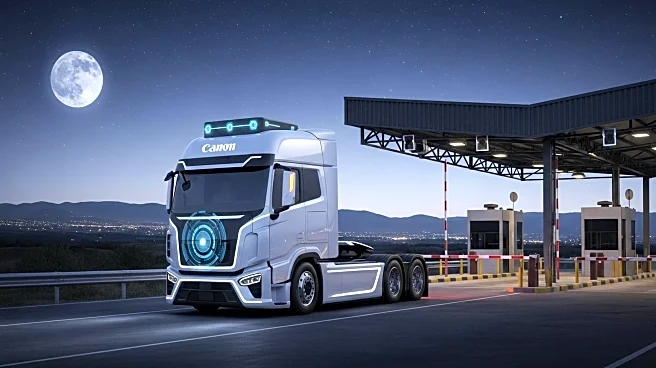What's Happening?
Einride, a Stockholm-based company specializing in freight technology systems, has successfully completed the world's first cabless, electric, fully autonomous cross-border delivery. The self-driving truck crossed from Norway to Sweden at Ørje, Norway, without a human driver onboard. This milestone is part of the MODI Project, co-founded with the EU, which aims to advance heavy-duty autonomous transportation. The project seeks to improve the transport and logistics industry by introducing connected, cooperative, and automated mobility systems. Einride's technology includes electric and autonomous heavy-duty vehicles, charging infrastructure, and an intelligent freight operating system. The company has integrated its autonomous trucks with Norway's Digitoll digital customs systems to streamline border customs clearance.
Why It's Important?
This development marks a significant advancement in the logistics and transportation industry, showcasing the potential of autonomous technology to enhance safety, efficiency, and sustainability. By eliminating the need for a human driver, Einride's technology could reduce labor costs and increase operational efficiency. The successful cross-border operation demonstrates the feasibility of autonomous vehicles in international logistics, potentially leading to widespread adoption. This could benefit companies by reducing emissions and improving safety, aligning with global sustainability goals. The initiative also highlights the importance of regulatory cooperation and technological integration in advancing autonomous transportation.
What's Next?
The success of this operation may encourage further development and deployment of autonomous vehicles in logistics. Stakeholders, including government agencies and logistics companies, may explore similar technologies to enhance their operations. The MODI Project will continue to focus on enabling the safe rollout of autonomous transportation across various market applications. As the technology matures, regulatory frameworks may evolve to accommodate autonomous vehicles, potentially leading to broader adoption in the logistics industry. Companies like PostNord, which participated in the project, may continue to explore innovative solutions to improve logistics sustainability and efficiency.
Beyond the Headlines
The integration of autonomous technology in logistics raises ethical and legal considerations, such as data privacy and liability in case of accidents. The shift towards automation may impact employment in the logistics sector, necessitating workforce retraining and adaptation. Long-term, the success of autonomous vehicles could lead to significant changes in supply chain management and urban planning, as transportation networks adapt to new technologies. The collaboration between countries and companies in this project underscores the importance of international cooperation in advancing technological innovation.










